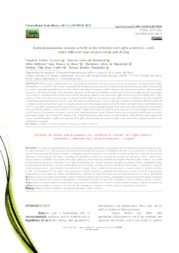Endo-ß-mannanase enzyme activity in the structures of Coffea arabica L. seeds under different types of processing and drying.
Endo-ß-mannanase enzyme activity in the structures of Coffea arabica L. seeds under different types of processing and drying.
Author(s): FERREIRA, V. F.; RICALDONI, M. A.; ROSA, S. D. V. F. da; FIQUEIREDO, M. A.; COELHO, S. V. B.; FANTAZZINI, T. B.
Summary: Enzymes play a fundamental role in degradation of molecules during seed germination, development, and deterioration. Endo-β-mannanase is one of the main enzymes responsible for hydrolysis of mannans in the endosperm during germination of coffee seeds through its action in hydrolytic degradation of cell walls and in weakening the structures of the endosperm that surround the embryo, allowing radicle emergence. The aim of this study was to determine the activity of the endo-β-mannanase enzyme in the structures of coffee seeds for the purpose of assessing the relationship between this activity and the physiological quality of the seeds under different processing and drying methods. Coffea arabica L. fruit in the cherry maturity stage was subjected to three different types of processing: natural (seeds maintained in the fruit itself), fully washed (fruit pulped mechanically and the seeds demucilaged by fermentation in water), and semi-washed or demucilaged (both fruit pulp and mucilage removed mechanically); and two methods of drying: slow drying (suspended screen) in the shade, and rapid drying in mechanical dryer at 35°C to a moisture content of 11±1%. After processing and drying, the physiological quality of the seeds was evaluated through the germination test, and endo-β-mannanase enzyme activity was quantified. Coffee seeds submitted to natural processing have lower physiological performance, as well as greater deterioration and greater activity of the endo-ß-mannanase enzyme. Removal of mucilage during fully washed and semi-washed processing of coffee seeds reduces the activity of the endo-ß-mannanase enzyme and lowers deterioration, especially after faster drying. The enzyme endo-ß-mannanase is efficient in studying of the effects of processing and drying on coffee seeds, and can be evaluated in whole seeds, endosperms or embryos.
Publication year: 2018
Types of publication: Journal article
Unit: Embrapa Coffee
Observation
Some of Embrapa's publications are published as ePub files. To read them, use or download one of the following free software options to your computer or mobile device. Android: Google Play Books; IOS: iBooks; Windows and Linux: Calibre.
Access other publications
Access the Agricultural Research Database (BDPA) to consult Embrapa's full library collection and records.
Visit Embrapa Bookstore to purchase books and other publications sold by Embrapa.

